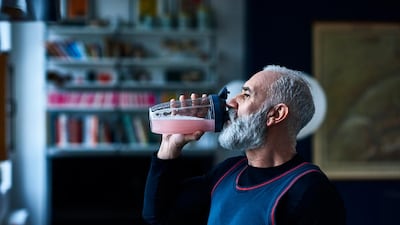I would have been less grumpy while writing this column if I wasn’t on a low-carb diet.
I first came across the idea of the so-called “paleo” or “primal” way of eating when I moved for a couple of years to the Netherlands and was trying to lose weight. The idea behind it is to eat like a version of our hunter-gatherer ancestors who, supposedly, persisted on plants, berries, nuts and meat rather than our carb-rich modern diet of bread, rice, pastries, Nutella and chocolate hummus. I embraced it with fervour and added another cult to my repertoire by joining a CrossFit gym, where I attended workouts religiously for several months, even if they were at 7am.
I did lose the weight, and promptly put it back on when I moved to Beirut as a correspondent, because what is life without a cheese manousheh for breakfast and who eats hummus with a spoon? It is also a lot harder to say no to Arabic sweets and pastries than it is to the austere pillars of Dutch cuisine, like fried cheese balls and the tiny pancakes known as poffertjes.
Still, you tend to stay attuned to these sorts of health and fitness communities online, if only so you can vicariously see what your life would be like if you weren’t sitting behind a desk all day and had a more than fleeting knowledge of Olympic weightlifting regimes.
The health trends I found most fascinating, though, were always the ones where people introduced artificial hardships to their lives in order to compensate for the relative physical comfort of modern existence.
Take cold showers and intermittent fasting, for example. In the first, people opt to take showers with very cold water because some studies have apparently shown a reduction in depressive moods because of it, as well as better circulation and other health benefits. A more advanced version of this practice is cold immersion, where rather than a shower you can take a dive in an ice bath, in water that is around 10°C. In intermittent fasting, you limit the hours in which you have your meals, a practice that may help with obesity, inflammation and other metabolic conditions.
I am not a scientist, so I am not disputing any of the evidence for the efficacy of these methods, and by many accounts they seem to work for at least some of those who try them. But I do find the concept of induced hardship somewhat bewildering. I took a lot of cold showers in Beirut because rolling power cuts meant the water heater was only intermittently operable, and have no desire to repeat the experience voluntarily. Many of us also fast during Ramadan, but the idea of doing it solely for the physical hardship, without any of the spiritual underpinning, seems beside the point. It is a bit like distilling yoga to exercise and posture devoid of its philosophical pedigree.

This is also my instinctive response to the more damaging social movements I’ve been more exposed to in the West, like anti-vaxxers. Conspiracy theories about vaccines are not exclusive to the West, but they do feel to me more widespread in the North American public discourse, at least on social media, than back home. It is an absurd movement to me because it appears, prima facie, as though the conquering of diseases like measles has left an emptiness that needs to be filled with the artificial creation of fear, that these instincts that respond to threats to survival need to be fed somehow. This is also how I continue to think of people like the US Capitol riot protesters and the fears white nationalists harbour of being replaced by ethnic minorities in politics and the echelons of power.
One of the biggest culture shocks for me as an immigrant to Canada after years reporting in the Middle East is the idea that the past decade was normal. It’s not that there was no hardship, because of course there was and is, but that for the most part each day was somewhat predictable, as opposed to potentially featuring a coup attempt or a new war. I keep wondering if the restlessness I continue to feel, the disconnect from the reality back home and the feeling of drift over here means there is something broken in my perception of reality or what it should be.
This is why I have grown, over time, to begrudge less what I thought of in the past as a mildly amusing Western cultural indulgence that can afford to make life a little bit harder. Even if it is artificial, I can see how the embrace of challenge and discomfort can be a tool to build resilience and character when life offers fewer more profound challenges. As Ryan Holiday, a writer and populariser of the philosophical tradition of stoicism, writes in his book The Obstacle is the Way: "Never forget, within every obstacle is an opportunity to improve our condition."
As a result, I have made peace with low-carb diets, cold plunges, intermittent fasting and all the other minor hardships we might impose on ourselves.
Kareem Shaheen is a veteran Middle East correspondent in Canada and a columnist for The National


